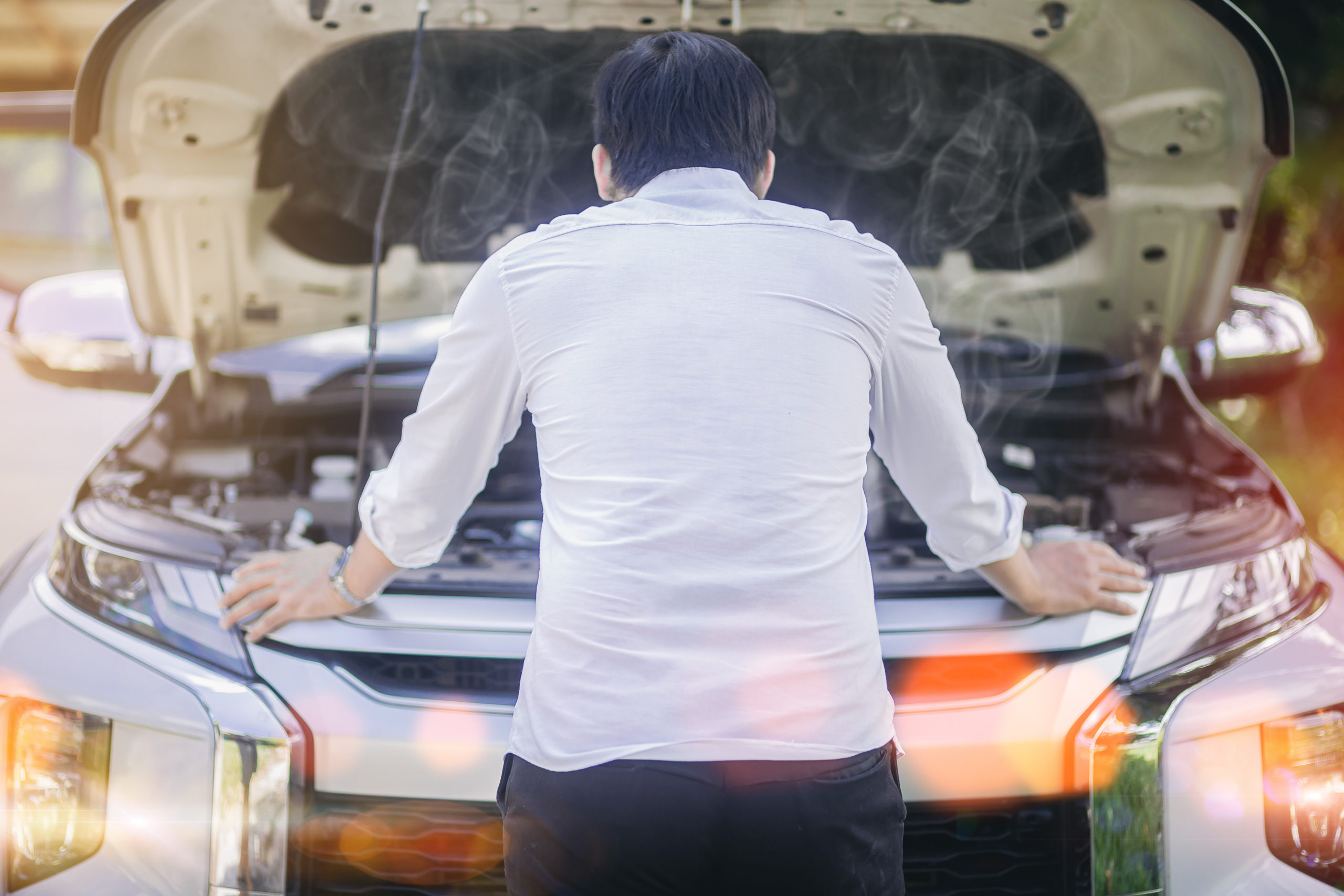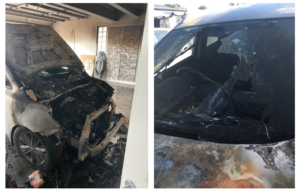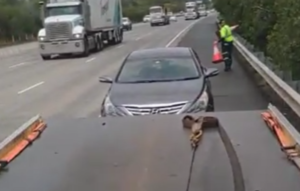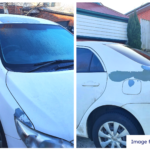
Road danger: Hyundai owners warn of car failures while driving
Last updated on March 28th, 2025
Mandie Cowley was driving with her daughter on a busy regional highway in Victoria when her Hyundai started losing power.
“The only place I could pull over was on a bend and there was a lot of trucks. I was absolutely petrified that a truck was going to come up behind me and hit the car,” she said.
Michael Steele’s son, still a P-plater, was driving his Dad’s car at a similar high speed on a country highway in Queensland when it made a grinding sound.
"And it just came to a halt, nothing was working. He was very lucky to get it to the side of the road,” Michael said.
Nina Persin’s partner was driving at 100kmh on the Pacific Motorway, in south-east Queensland, roads still slippery from the floods, when his engine seized up.
“There was no warning light, nothing,” she said. “When the engine seized, the brakes stopped working, as did the steering wheel. My partner had huge difficulties steering the car away from the right-hand lane, avoiding the trucks on the road, towards the left lane.
“I don’t even want to imagine what could have happened."
You can watch Nina and other affected Hyundai owners share their shocking stories on A Current Affair.
‘They are like ticking time bombs’
Their cars might be secondhand, but they have all been well maintained. One was only just out of warranty, and another hadn’t even done 80,000km. And none of the owners thought the manufacturer would ignore something as dramatic, and potentially dangerous, as a sudden engine failure.
But while they are feeling the financial sting and are angry at Hyundai’s lack of customer care, these car owners are far more concerned about the safety issues.
Gordon Anderson, who started a Facebook group called Australian Hyundai Engine Failures after his daughter’s car seized up, said he didn’t understand how these cars were allowed on the roads.
“They are like ticking time bombs,” he said. “I wrote a letter to the ACCC and asked them if it would take someone dying before they did anything about it."
His daughter had a lucky escape. After detecting a faint ticking sound, Gordon suggested she call the RACQ if it was still there when she drove home. They advised her not to drive it. Several weeks later, he found out the engine had seized up when the mechanic drove it into the workshop.
“I couldn’t believe it,” he said. “Just another 15 minutes of driving and my daughter could have been killed. It could have seized on the highway without any warning.”
Gordon started researching online and was alarmed at what he found. Engine failure and fire problems have plagued Hyundai and its affiliate Kia for years.
US agency fines Hyundai millions
In November 2020, the US Government’s road safety agency, the National Highway Traffic Safety Administration, ordered Hyundai to pay $US54 million in civil penalties. The agency also ordered Hyundai to spend $US40 million to improve safety operations after a three-year investigation.
Hyundai recalled hundreds of thousands of vehicles, dating back to 2011 models, fitted with Theta II engines in the US in 2015. The problem was attributed to debris left behind in the manufacturing process that could restrict oil flow to rod bearings. This, in turn, caused them to fail and putting the engine at risk of stalling or catching fire.
South Korean engineer Kim Gwang-ho, a Hyundai employee for 26 years, was later revealed as the whistleblower. He told the US regulator in 2016 that Hyundai wasn’t doing enough to resolve issues with the engine fault that prompted the initial recall. The manufacturer had claimed the fault only applied to engines made before April 2012. However, both Hyundai and Kia then recalled more than 1.2 million vehicles for the same problem 18 months later.
In announcing the record penalties, the NHTSA said it was “critical that manufacturers appropriately recognise the urgency of their safety recall responsibilities”.
In January 2017, Hyundai settled a federal class action in the United States on behalf of owners of 2011-2014 Hyundai Sonatas. Gibbs Law Group alleged that Hyundai “sold Sonata vehicles with defective rotating assemblies in the Theta II 2.4L engines that cause sudden and catastrophic engine failure … rather than address this safety problem by warning drivers and recalling its dangerous vehicles, Hyundai has concealed the problem from consumers and implemented a concerted practice of denying warranty coverage for failed engines”.
Complaints to Hyundai go unanswered
As part of the settlement, Hyundai was required to extend its warranty, as well as provide a free loan vehicle if requested, or reimburse owners for reasonable rental car expenses.

(Photo: Anne-Maree Johnston's Hyundai ix35 after engine caught fire)
Frustrated car owners in Australia have had no such assistance. They can’t even get anyone to listen. Hyundai’s Customer Care Centre don't answer calls or emails. Or they give them the runaround before finally responding to say that as the affected car is out of warranty, it isn’t their problem.
Complaints to the relevant government authorities and the Australian Consumer and Competition Commission (ACCC) have also been fruitless.
This is despite several recalls in Australia for Hyundai models, including the i45 and Santa Fe in 2017, and for more than 93,000 Tucson models sold between 2014 and November 2020. (Hyundai Motor America issued another recall in February for several Sante Fe models, as well as 2014-2015 Tucson vehicles, for the same reason.) At the time, Hyundai said they would contact customers directly and the repairs would be free.
Nina Persin said that 10 months before they bought their 2012 Hyundai i45, the previous owner had taken the vehicle to be inspected because of the recalls. They were told everything was fine, despite not opening the engine up to check.
“Hyundai is clearly avoiding any kind of responsibility and liability for these engines, even though it is clearly mentioned on the Department of Infrastructure website, with all the VIN (vehicle identification numbers) listed in the recall,” Nina said. “Because it has had a recall, they are legally bound under Australian Consumer Law to inspect and replace the engines where necessary.”
Authorities pass the buck
Like the others in the Facebook group, Mandie and David Cowley had looked after their car. The Hyundai IX35 elite model was bought new and was serviced at Hyundai dealerships until the five-year warranty ran out. It was still regularly serviced and had only done 75,000km when it was towed to the local mechanic.
“I contacted Customer Care and they didn’t get back to us – I rang them about four times in a row,” David said.
When they finally responded, they tried to blame the delay on the dealership, which had never been contacted. When David was finally able to get them to agree to look at the car, he was told the engine failure had effectively turned a $20,000 vehicle into a lemon.
Their complaints to various authorities they thought might help fell on deaf ears. “When I complained to the ACCC, they said it wasn’t our responsibility and to contact the Department of Infrastructure,” David said.
“Consumer Affairs in Victoria even sent (Hyundai) a demand letter and they didn’t get back within the 28 days. Eventually she rang Customer Care and they said ‘we’re not doing anything about it’.”
But even if the Cowleys could get the $14,000 engine replaced free of charge, David said he couldn’t sell the car knowing its history.
“I said to my mechanic my moral compass won’t allow me to do that,” he said. “This is a safety issue. If Mandie hadn't been able to get off the road where she did, if it had been around the bend, there would have been a fatality.”
‘The worst customer service’
Michael said after Hyundai’s Customer Care Centre ignored his complaints. He wrote to them to say he would take the issue to the ACCC, and he expected a refund or for the car to be fixed free of charge.
“Obviously they knew the ACCC wasn’t going to do anything but you have to speak up,” he said. “I always tell my kids that it’s important to stand up to any company, because otherwise they’ll just run over people who aren’t able to stand up for themselves.”

(Photo: Nina Persin's Hyundai i45 being towed after engine seized on highway)
After members of the Facebook group started posting regular complaints on Hyundai Australia’s Facebook page, they noticed the company stopped allowing feedback.
“I would say it’s the worst customer service I’ve ever come across in my life. They just don’t seem to care,” Michael said.
This is despite the company giving the ACCC a court enforceable undertaking in 2018 to improve its compliance with consumer guarantee obligations under Australian Consumer Law. Hyundai said it would “provide consumers with the ability to obtain information online about any technical and/or safety issues with their vehicles and any available remedies”.
Gordon started the Facebook group, which amassed more than 100 members in less than a month, to raise awareness and encourage Hyundai to take responsibility. He hopes that the volume of consumers who have experienced catastrophic engine failures will also put pressure on the ACCC to act. The group wants the car manufacturer to be held to account in the same way as they have been overseas.
While they are considering a class action, these concerned Australians are more determined than ever to do everything they can to avert a tragedy.
“Someone’s going to die,” Gordon said. “They have to take responsibility."
Below is the list of vehicles for which we have received engine complaints:
2014 i30 SE Auto
2012 ix35 Elite Auto
2013 ix35 Wagon AWD
2013 ix35 Highlander Auto AWD
2014 ix35 Trophy Auto AWD
2014 ix35 SE Auto
2015 ix35 SE Auto
2015 i35 SX
2011 ix45 Elite Auto
2011 ix45 Premium Auto
2012 i45 Active Auto
2016 Tucson Active X Auto 2WD
2017 Tucson Active X Auto 2WD
2018 Santa Fe Auto Wagon
2021 Kona Elite Wagon Auto AWD






